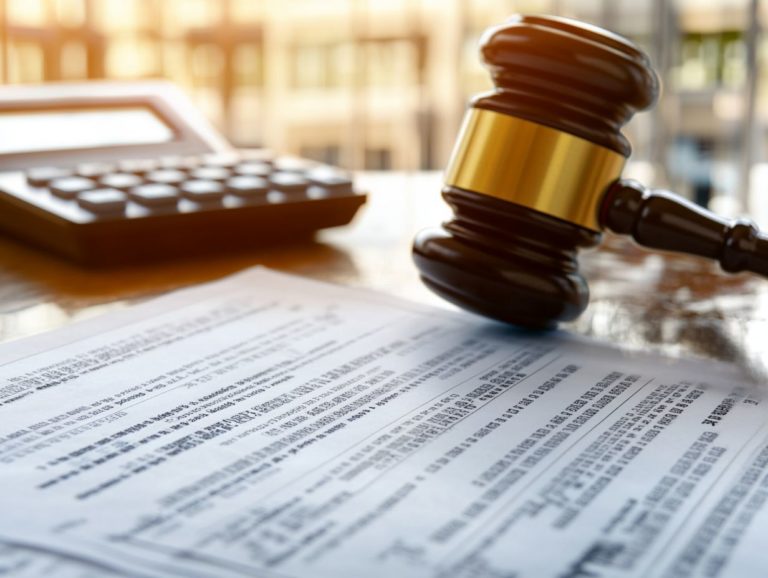What to Do if You Are Falsely Accused of a Crime?
False accusations can alter the course of your life in an instant, leaving you grappling with confusion, fear, and a tarnished reputation.
This article delves into the complexities surrounding these accusations, exploring what they are, common types, and the emotional and legal consequences they entail.
If you ever find yourself in the unfortunate position of being wrongly accused, essential steps include gathering evidence and seeking legal support.
Discover how to navigate public perceptions and embark on the journey to rebuild your life after such a distressing experience. Join us as we unpack this critical topic, providing you with guidance and insight for facing this challenging situation.
Contents
- Key Takeaways:
- Understanding False Accusations
- Reactions to False Accusations
- Summary
- Steps to Take if Falsely Accused
- Handling the Accusation Publicly
- Moving Forward After a False Accusation
- Frequently Asked Questions
- What should I do if I am falsely accused of a crime?
- Should I hire a lawyer if I am falsely accused of a crime?
- What evidence should I collect if I am falsely accused of a crime?
- Can I be arrested if I am falsely accused of a crime?
- What are my rights if I am falsely accused of a crime?
- What can I do if the accuser is making false statements?
Key Takeaways:

- False accusations can have serious emotional and legal impacts on your life. It’s crucial to understand them and how to handle them.
- When wrongly accused, gather evidence and seek legal counsel to build a strong defense and protect your reputation.
- Communicate with those closest to you and focus on rebuilding your life, seeking support and coping mechanisms to move forward.
Understanding False Accusations
Understanding false accusations is vital in today’s society. Such allegations can inflict serious emotional pain, tarnish reputations, and leave enduring scars on individuals’ lives.
In the criminal justice system, you re presumed innocent until proven guilty. However, a false accusation can unleash severe repercussions, including emotional damage and the urgent need for legal representation.
It’s important to acknowledge that both private citizens and public figures can fall victim to these falsehoods, which can lead to defamation lawsuits rather than criminal charges.
What Constitutes a False Accusation?
A false accusation occurs when you’re wrongfully accused of a crime you didn t commit, leading to reputational damage and potential legal claims for defamation. These accusations can stem from misunderstandings, misinterpretations, or even malicious intent.
Valid allegations usually come with credible evidence, while false claims often lack real substantiation, leading to devastating consequences for you.
This highlights the need for meticulous evidence gathering within the legal process. Solid proof is essential to affirm or refute any claims. When you face such situations, taking appropriate legal measures to protect your rights is paramount.
This also helps restore your reputation within the community.
Common Types of False Accusations
Common types of false accusations include malicious prosecution, where someone is wrongfully charged with a crime, and defamation per se, which means an accusation that hurts someone’s reputation without needing extra proof.
These accusations can take various forms, particularly in sexual harassment cases, where unsubstantiated claims can obliterate careers and inflict immense emotional and financial distress.
Similarly, false allegations of domestic violence can lead to dire legal consequences, including restraining orders and loss of custody rights in family court.
In child custody disputes, accusations often become strategic maneuvers, endangering the child’s well-being and complicating relationships.
Each of these scenarios underscores the serious ramifications of false claims, highlighting the importance of thorough consideration and investigation before making such grave allegations.
Reactions to False Accusations
Reactions to false accusations can be profoundly impactful, often resulting in significant emotional distress. You may grapple with intense feelings of shame, anger, and confusion as you navigate the complexities of your situation and its effects on your family relationships.
Act now to protect your rights and seek the support you need. If you find yourself in this situation, remember that you are not alone, and help is available. Take the first steps towards rebuilding your life today!
Summary
False accusations can change everything in your life. By understanding what they are, recognizing the types, and knowing how to respond, you can take control. Remember to gather evidence, seek legal help, and rebuild your reputation. The journey may be difficult, but you have the power to move forward.
Emotional and Psychological Impact

The emotional and psychological toll of false accusations can be devastating. Often, it leads to trauma, anxiety, and a profound sense of isolation as you fight to prove your innocence.
Such experiences can create a significant ripple effect on your mental health. Heightened stress levels and pervasive self-doubt may surface.
You might struggle with depression and a lack of motivation. Your once sturdy sense of self may begin to crumble under the weight of unwarranted allegations.
Seek supportive environments and therapy; they can help alleviate some of that emotional strain. Engaging with mental health professionals and connecting with empathetic individuals is essential.
Maintaining open communication with close friends and family is vital. It can help rebuild trust and provide a support system as you navigate the emotional upheaval caused by reputational damage.
Legal Ramifications
The legal ramifications of false accusations can be extensive. You may face potential criminal charges for filing false reports and the threat of lawsuits that can harm your reputation.
As you navigate the court system, both you and the accused may experience significant emotional and financial stress. For the accused, having strong legal help is crucial in proving innocence.
You must also prepare for the possibility of countercharges if your claims are found to be unfounded. A strong attorney-client relationship is vital for effective guidance in these scenarios.
Acclaimed legal professionals understand the nuances of these cases. They can help you strategize defenses, exploring avenues like misidentification while emphasizing the importance of truth in seeking justice.
Steps to Take if Falsely Accused
Act swiftly! Every moment counts when facing a false accusation.
Start by gathering all relevant evidence; this will be the cornerstone of your defense. Consider enlisting legal counsel to guide you through the complexities of the investigation and court proceedings.
Taking these steps will enable you to navigate this challenging situation with confidence.
Gathering Evidence and Building a Defense
Gathering evidence and building a defense are crucial steps in tackling false accusations. You ll need to compile documentation, collect testimonies, and gather any relevant information to challenge the claims against you.
This process means analyzing physical evidence, such as emails, text messages, or video footage, which can provide vital insights. A defense attorney is an essential ally in identifying and collecting various types of evidence.
By establishing a strong network of supporting evidence and utilizing their legal expertise, your defense attorney can significantly boost your chances of a favorable outcome. Every piece of information can be strategically used to undermine the validity of the accusations you face.
Seeking Legal Counsel
Seeking legal counsel is absolutely essential when faced with false accusations. An experienced attorney provides valuable legal advice and representation. They expertly guide you through the complexities of your case while formulating an effective lawsuit strategy.
The details of legal proceedings demand a deep understanding of the law, as well as insights into courtroom protocols and strategies that only seasoned professionals truly possess.
If you face untrue claims, having someone to advocate for you is crucial. They skillfully frame your story, enabling it to resonate with judges and juries alike.
Qualified legal counsel can leverage their expertise to gather evidence, identify witnesses, and craft compelling arguments that can dramatically influence the trajectory of your case. Their support can be a game-changer, transforming what might seem like an overwhelming legal battle into a well-managed and strategic process.
Handling the Accusation Publicly

Navigating a false accusation in the public eye can feel overwhelming, particularly in our social media-driven world, where perceptions can quickly mold your reputation.
Engaging in effective communication with your family, friends, and employers is crucial to uphold your credibility and initiate the vital journey of repairing your reputation.
Communicating with Family, Friends, and Employers
Communicating effectively with your family, friends, and employers after facing false accusations is essential. This helps mitigate emotional damage and work toward repairing your reputation.
Engaging in open and honest dialogues can establish a foundation for understanding and empathy, aiding in clearing up any misunderstandings. These heartfelt conversations create a safe environment and promote emotional recovery, as sharing your truth can lighten the load you carry.
In the workplace, transparency is just as vital; it fosters trust among colleagues and can turn a potentially damaging situation into an opportunity for growth. By prioritizing honesty in these sensitive interactions, you can rebuild connections and showcase your authenticity, ultimately leading to stronger relationships and a more supportive atmosphere for everyone involved.
Moving Forward After a False Accusation
Moving forward after facing a false accusation demands resilience and a thoughtful approach. It s essential to implement strategies that will help you rebuild your reputation and restore trust in both your personal and professional life.
While doing so, you’ll also need to address and overcome the emotional distress that may linger, ensuring a holistic recovery.
Coping with the Experience
Coping with the weight of false accusations can be a daunting journey. Establishing a robust support system is essential to navigating the emotional turmoil and trauma these allegations can inflict.
Reaching out to a therapist can prove immensely beneficial. Professional guidance offers you a safe space to process your feelings and cultivate healthier coping mechanisms.
Additionally, support groups can play a crucial role in your healing journey. They provide an opportunity to connect with others who have faced similar challenges, fostering a sense of community and understanding that can be incredibly comforting.
Engaging in personal reflection through journaling or meditation allows you to gain deeper insights into your emotions, helping you build resilience. When combined, these strategies can significantly enhance your emotional recovery, paving the way toward healing and enablement in the face of adversity.
Rebuilding Reputation and Trust
Rebuilding your reputation can be tough, but with the right steps, you can regain trust. This process often requires consistent effort and may even need legal actions to restore your standing in the community and among peers.
Start with personal accountability recognize the emotional impact of the accusation and take proactive steps to address it. Talk to a legal advisor to explore possible options for recourse, such as defamation claims, which can help clear your name if someone spreads false information about you.
Cultivating transparency in your actions and communication can significantly mend relationships and demonstrate your integrity. Involving supportive communities friends, family, or professional networks offers not only emotional support but also helps amplify positive narratives that counter the false accusations.
Together, these efforts contribute to a comprehensive strategy aimed at reinstating trust and enhancing your social standing.
Frequently Asked Questions

What should I do if I am falsely accused of a crime?
If you are falsely accused of a crime, it is important to remain calm and seek legal advice. Do not speak to the police or anyone else about the accusation without first consulting a lawyer.
Should I hire a lawyer if I am falsely accused of a crime?
Yes, it is highly recommended to hire a lawyer if you are falsely accused of a crime. A lawyer will guide you through the legal process and provide the best defense to clear your name.
What evidence should I collect if I am falsely accused of a crime?
Act quickly to gather evidence that proves your innocence. This may include:
- Witness statements
- Surveillance footage
- Any other relevant documents
Can I be arrested if I am falsely accused of a crime?
Yes, it is possible to be arrested if you are falsely accused of a crime. However, if this happens, you have the right to remain silent and request to speak with a lawyer before answering any questions.
What are my rights if I am falsely accused of a crime?
If you are falsely accused of a crime, you still have the same rights as anyone else accused of a crime. This includes the right to remain silent, the right to a lawyer, and the right to a fair trial.
What can I do if the accuser is making false statements?
If the accuser is making false statements, gather evidence that can prove their statements untrue. This may include:
- Witnesses
- Surveillance footage
- Any other relevant documents
Your lawyer can also help you challenge the false statements in court.






